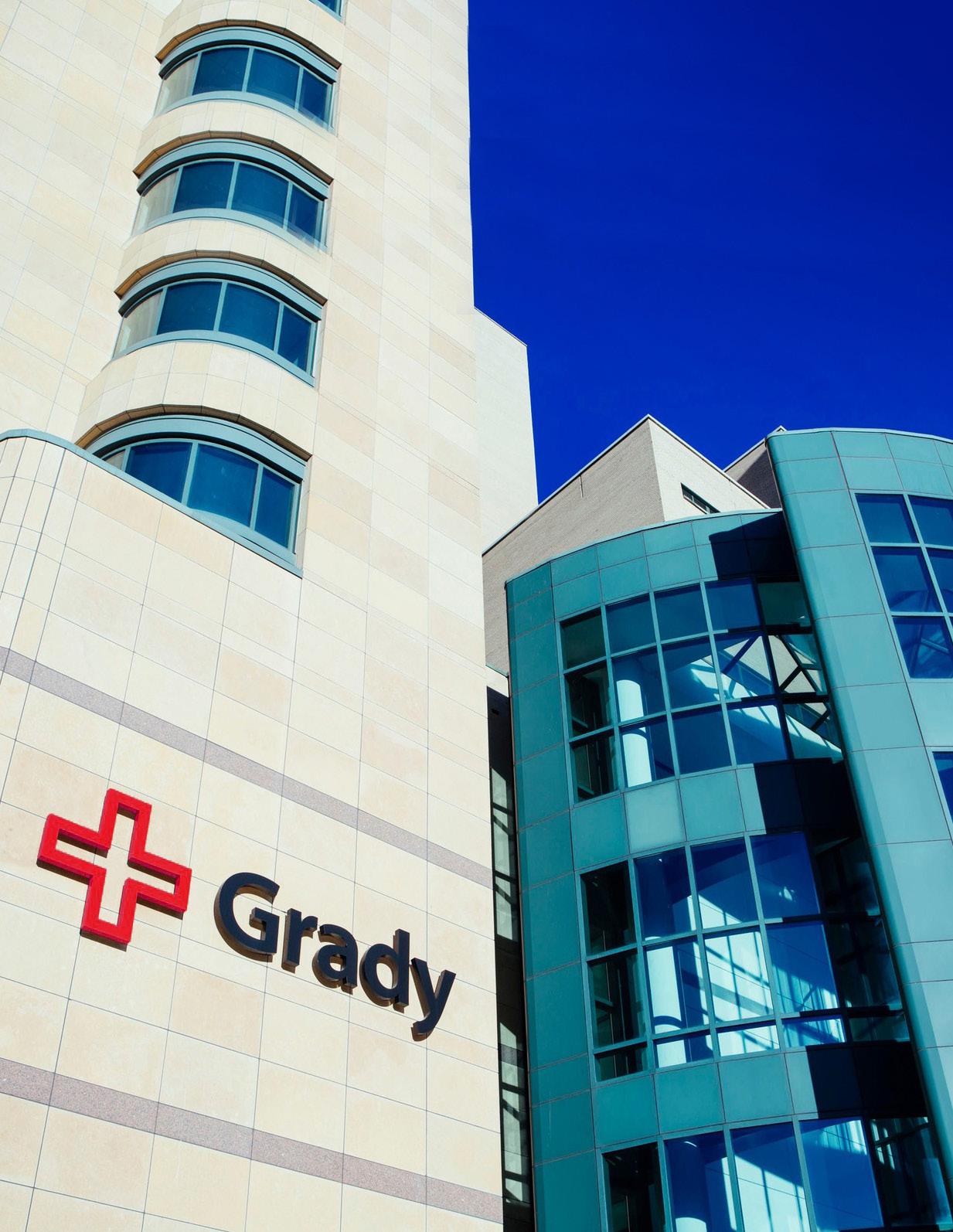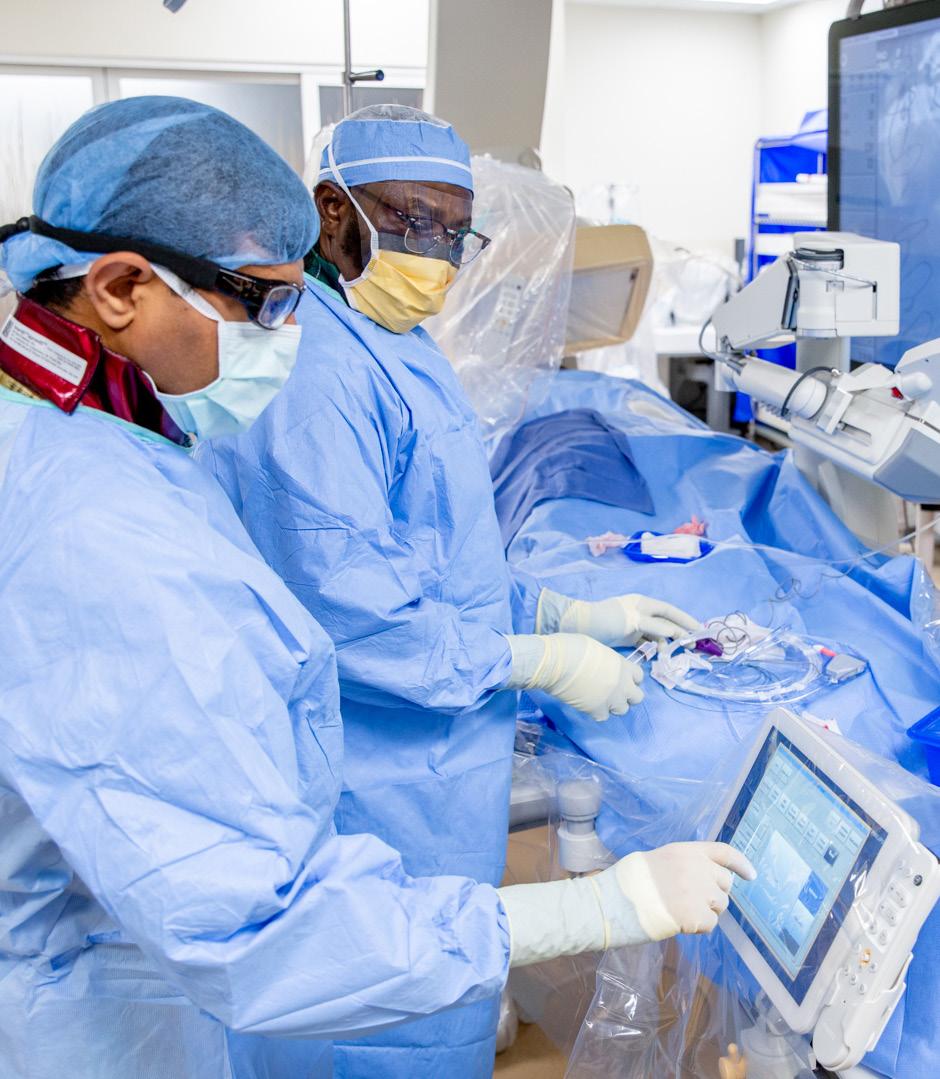AN ATL AS FOR INNOVATION



This book highlights Grady Health System and its excellent contributions to the health care field. Grady has made tremendous strides in improving patient safety and the quality of care provided to its community A 2022 site visit to Grady by the AHA Living Learning Network team offered a glimpse into the inner workings of a large, public safety-net health system. This book provides insightful commentaries, captivating stories and stunning visuals as Grady clinicians and leaders share their experiences and perspectives.
When founded in 1892, Grady Hospital had 110 beds and one operating room with an amphitheater for students and staff. Grady has grown considerably from its original three-story facility and now stands as one of the largest public health systems in the United States. Grady Health System today continues to maintain its strong commitment to the health care needs of the underserved while offering a full range of specialized medical services for all segments of the community.
Funded by the Centers for Disease Control and Prevention (CDC), the LLN is a virtual AHA community for hospitals, health systems, public health organizations and state hospital associations to discuss, ideate and reform health care in response to COVID-19 with other health care leaders from across the field. The participating members have access to a curated network of respected subject matter experts and distinguished colleagues to participate in real-world discussions, expand perspectives and problem-solve together. All images in this book are courtesy of Grady Health System.

As the CEO of Grady Health System and current chair of the American Hospital Association, I want to express my pride in the incredible work these organizations — and all hospitals and health systems — have accomplished, especially during such unpredictable times. This work continues to move us forward in removing barriers to ensuring quality health care for all who need it.

At Grady, we work to deliver quality, comprehensive and compassionate care to our patients. We are committed to meeting the health needs of structurally marginalized communities within Fulton and DeKalb counties in Georgia, metro Atlanta and beyond. Grady prioritizes health equity because we understand the importance of everyone having access to the same level of high-quality care. We lead through clinical excellence, innovative research and a continued focus on education and training. Our team works alongside partners with a common goal: improving our community’s overall health and well-being.
As you will see in the following pages, Grady’s commitment to these essential areas drives pioneering approaches and strategies to deliver exceptional care, improve patient outcomes and ensure value. The COVID-19 pandemic has tested us, but we have emerged stronger and more resilient.

I am grateful for the expertise and guidance provided by the AHA Living Learning Network over the past few years, supporting our work to deliver excellent care and eliminate health disparities.
Grady will continue to lead the way in advancing health care and raising the bar for providing care in our region.
With gratitude,
JOHN HAUPERT President and CEO of Grady Health System

Grady Health System’s values perfectly capture how it delivers essential care with humanity, compassion and kindness.

Be PatientCentered
AN ATL AS FOR
Be Safe
Do Right Do Good
Serve Others with Excellence
At Grady, one of our core values is being patientcentered. Our cancer team is incredibly proud to be honored by Planetree for our commitment to providing our patients with the highest-quality, patient-centered care. This honor proves that when someone comes to us for treatment, we keep them at the heart of care delivery.


 — POOJA
President,
— POOJA
President,
There is a heart and a calling that come with working at a place like this. And the desire to make it better and continue to improve it and the patients that we serve — that’s a huge part of the reward of working here.
Grady has a long-standing commitment to patient safety and quality care, with its “True North” stated as: Ensure Safety, Anticipate Needs and Exceed Expectations.

To live up to that pledge, the health system is starting its journey to become a highreliability organization (HRO).
Within an HRO culture, everyone is acutely aware that even small failures in safety protocols or processes can lead to catastrophic outcomes.
Creating an environment that supports an HRO mindset is essential to achieving Grady’s quality and safety goals.
When the pandemic started, all the departments in Grady came together as one. The infection prevention and control team went to all the departments (clinical and nonclinical) frequently as a team and often with environmental services, to train staff on infection control practices, including the use of personal protective equipment (PPE) to keep patients and themselves safe. The team took the time to walk staff through infection prevention and control practices step by step, answer their questions and provide reassurance when they were scared.

“TRUE NORTH”
PLEDGE: ENSURE SAFETY ANTICIPATE NEEDS EXCEED EXPECTATIONS
Before the pandemic, we had started operational rounding, where senior leaders go out to different departments on a weekly basis to learn from the front line based on LEAN principles, and [we] identified quality, safety, patient experience and throughput projects for this process. Sustaining that work during the pandemic was a challenge, but we managed to continue the work by keeping our quality and process improvement coaches engaged across the institution, kept up their training and made sure they were still able to interact with the front line.
 — ELHAM GHONIM, PHD, FAPIC Vice President, Patient Safety/IP/Epidemiology
— ELHAM GHONIM, PHD, FAPIC Vice President, Patient Safety/IP/Epidemiology



Ever since its founding in 1892, Grady Health System has evolved its care to fulfill the medical needs of communities across the Atlanta area. It treats some of the sickest, most medically complex patients through nationally recognized innovations in care.



When the pandemic hit, the supply chain of PPE dried up quickly, as did hand sanitizer Grady had contracted with a Fortune 500 company and almost overnight went into back-order status. At that point, the supply chain team decided to move toward self-manufacturing hand sanitizer and disinfectant wipes.
The team implemented a phased approach to develop the products, which included sourcing raw materials, connecting daily with the command center, coordinating with the infection prevention and control
team to ensure the products met safety and quality standards, partnering with the facilities team to find 8,000 square feet to set up an assembly line, and meeting with the human resources team to get temps and volunteers onboarded to help develop the products.
This innovative thinking helped the health system during an incredibly challenging time and is indicative of the type of leadership Grady has displayed time and time again.
Grady has Georgia’s first mobile stroke unit outfitted with a CT scanner, offering state-of-the-art telemedicine capabilities and staffed by experienced medical professionals. The mobile stroke unit can perform diagnostic scans and transmit them along with vital information to Grady’s Marcus Stroke and Neuroscience Center experts, making it possible to begin treating patients before they are moved from their homes or while they are en route to a stroke-ready hospital. During the pandemic, the unit stayed in service to continue supporting the treatment and diagnosis of stroke patients.





Grady Health System’s vision is to become a leading academic health system that leverages data to inform community-based interventions aimed at reducing health disparities among the populations it serves. To achieve this goal, Grady established its Health Equity Office in 2021 to foster diverse perspectives and ensure that everyone has access to quality health care while addressing health disparities in the Atlanta metropolitan area and beyond.

Teen Experience and Leadership Program (TELP) is a groundbreaking initiative aimed at fostering community partnerships and offering teenagers unique opportunities to delve into the world of health care. TELP provides an immersive experience, granting participants exposure to various health occupations and equipping them with essential leadership skills. By nurturing this pipeline, the program aims to bolster the workforce while empowering employees to serve as role models and deepen their community engagement.

Our Food as Medicine program has proved very successful in helping patients with certain chronic conditions improve their health. The opening of the Jesse Hill Market allows us to expand this important nutritional service in a space that’s easy for our patients to access. Patients with food prescriptions will be able to pick up fresh produce just feet away from our clinic building entrance. There will be cooking classes so that patients can learn how to prepare great-tasting healthy meals. Plus, staff, guests and even people working close by can stop in for healthy meal and snack options.
 — JOHN HAUPERT President and CEO
— JOHN HAUPERT President and CEO

Grady Health System embraces its patients through its slogan “Arms Open Wide.” Over time, Grady has built a robust brand known for its unwavering commitment to compassionate care, active community outreach and a steadfast focus on health equity, earning the public’s trust.


What I am most proud of in our operational work is that we had so many people that would come to us [and say], ‘I was told by such-and-such that I am positive, but I want to confirm that I am positive with you, since I trust you.’ When it came to COVID-19 vaccines, we had many other facilities giving vaccinations, but so many of our patients said, ‘I will only get the vaccine if you give it to me.’
 — JERI SUMITANI Director of Practice Operations, Infectious Disease Program
— JERI SUMITANI Director of Practice Operations, Infectious Disease Program

In order to engage with the community, you have to engage with the people this community engages with.
— TARIQ QURESHI Vice President, NeurosciencesFunded by the CDC, the AHA Living Learning Network (LLN) is a forward-thinking virtual community of hospitals, health systems, state hospital associations and public health organizations.


The AHA LLN first convened in 2020 to focus on the COVID-19 response. It has evolved with the current needs of the health care field to address patient safety, quality improvement, infection prevention and control (including health care-associated infections), health equity, rural health and public health. Through virtual events, real-time peer-to-peer sharing, a blog series and more, the LLN is connecting the field in new and exciting ways. To learn more about the LLN and to join its 650-plus membership, visit www.aha.org/center/ living-learning-network.
Grady Health System is a member of the AHA LLN and has consistently contributed to the network through peer-to-peer sharing. The LLN team extends its gratitude to Grady Health System for hosting an open and inspiring site visit, which showcased the organization’s innovative work and significant contributions to the field. This visit provided a valuable opportunity for peer-to-peer sharing, and we look forward to continuing our collaborative efforts to improve health care quality for all.
Source: Based on 2022 LLN Community Members.
